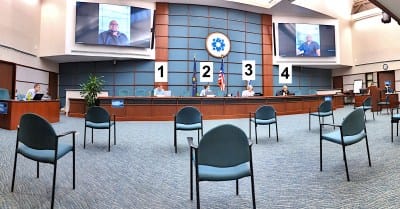Column: Judge rules Bloomington plan commission violated Open Door Law, second lawsuit now filed

In a ruling issued on June 1, Monroe County circuit court judge Catherine Stafford found that Bloomington’s plan commission violated Indiana’s Open Door Law (ODL) with its March 14, 2022 meeting.

The allegation that the meeting violated the electronic meetings section of the ODL was made in a lawsuit that I filed a week after it took place.
The electronic meetings section of the ODL requires that at least 50 percent of the plan commissioners have to be physically present at the meeting. That works out to at least five of nine plan commissioners.
At the March 14 meeting, six of nine attended, but just four plan commissioners were physically present. The other two participated remotely.
Bloomington’s city attorney Mike Rouker tried to argue that the 50-percent is supposed to be calculated based on the number of plan commissioners present at the meeting, not the number of seated plan commissioners. Rouker’s attempted argument was counter to the widely disseminated guidance on the relatively new section of the ODL, which was provided last year by Indiana’s public access counselor.
However, the judge stopped short of granting all of the requested relief—which was to void the decisions made at the March 14 meeting. That would have forced the plan commission to reconsider all of the business that it transacted at the meeting.
Still, the plan commission has now reconsidered one of the votes that was taken at the March 14 meeting.
At its May 16 meeting, the plan commission voted for a second time on the fee schedule change—which it had previously considered and approved at the disputed March 14 meeting. The plan commission voted 6–0 to increase fees for filing various requests that are made through the planning department, like rezones or plats.
That re-vote came five days after I filed a second lawsuit about the March 14 meeting. The second lawsuit asks the court to declare that the outcome of the vote on the fee requests had been only 4–0, not 6–0—because two of the commissioners who voted were not physically present. A 4–0 vote would have meant the fee increases did not achieve the five-vote majority that is needed.
What was special about the fee increases, compared to the other plan commission business transacted on March 14? The electronic meetings section of the ODL says that a member cannot participate in a meeting when the public body is trying to establish or increase a fee, among other things. Some of the other things include adopting a budget, reducing personnel, and increasing a tax.
It’s the same part of the ODL that in late April caused Bloomington’s board of park commissioners to delay its vote on the issuance of bonds (which entails increasing a tax). At the meeting when the park commissioners were set to vote on the bonds, just three of the four commissioners were in attendance, one of them electronically. That meant only the votes of the two commissioners who were physically present would have counted, which is not enough to establish a majority vote for that board.
The fact that the plan commission re-voted its fee increase, but only after the second lawsuit was filed, appears to be a tacit admission by the plan commission that its March 14 vote was not valid. The reason it was not valid, I would contend, is that it had just four votes in favor—because two of the commissioners were participating in the meeting electronically.
To count the votes of the two remote participants would violate the ODL. And four votes is not enough to achieve a majority on the nine-member plan commission.
For the second lawsuit, just as the first, I am representing myself. When a layman can file a successful lawsuit over these ODL violations, that is one indication of how obvious the violations are.




Comments ()